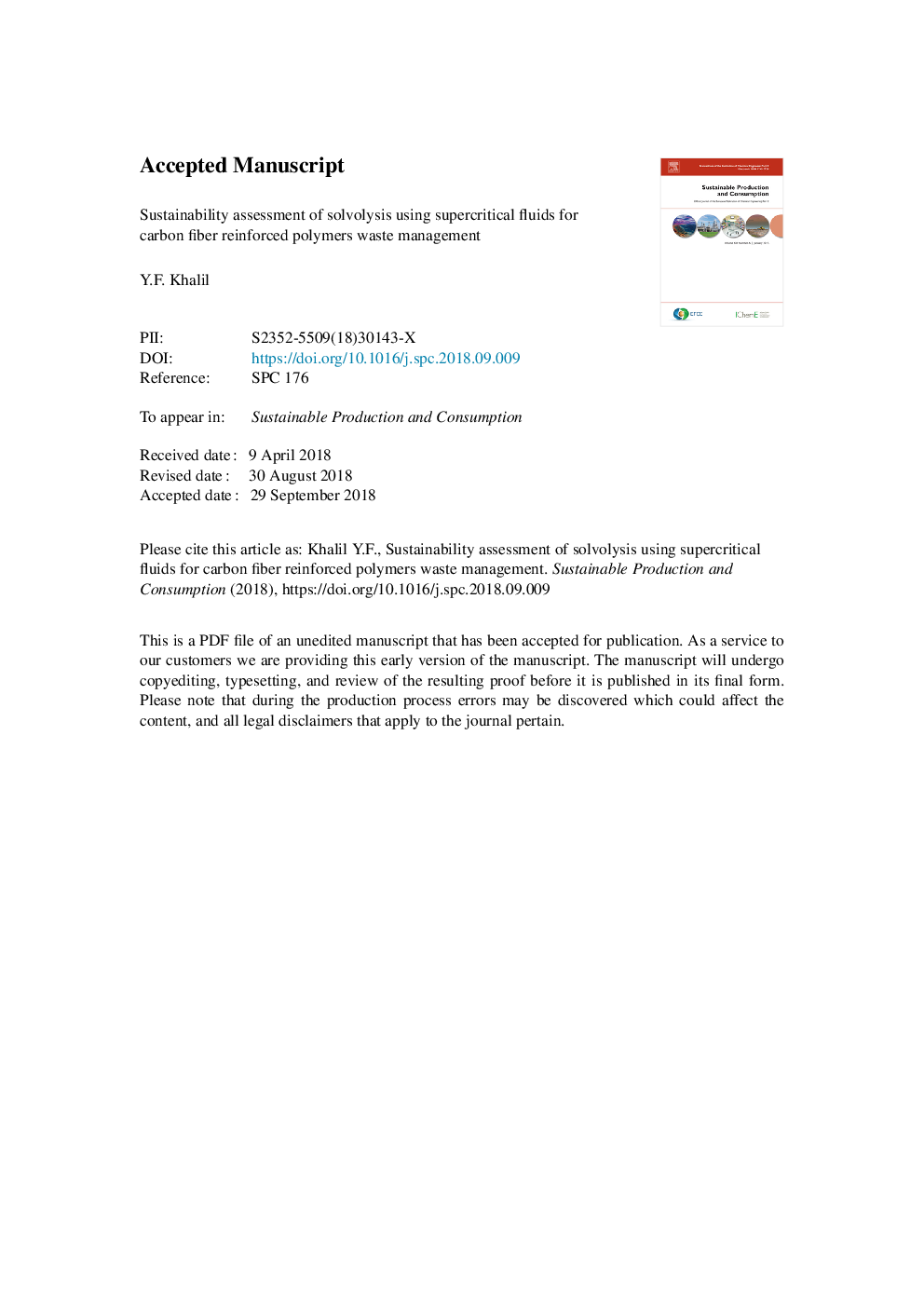| کد مقاله | کد نشریه | سال انتشار | مقاله انگلیسی | نسخه تمام متن |
|---|---|---|---|---|
| 11023636 | 1701258 | 2019 | 36 صفحه PDF | دانلود رایگان |
عنوان انگلیسی مقاله ISI
Sustainability assessment of solvolysis using supercritical fluids for carbon fiber reinforced polymers waste management
دانلود مقاله + سفارش ترجمه
دانلود مقاله ISI انگلیسی
رایگان برای ایرانیان
کلمات کلیدی
CTUhCFRPRCFNCFLCICradle to gateSCWSCCsVCFLCIATRLSCFEOLsupercritical water - آب فوق بحرانیEthylene glycol - اتیلن گلیکولLife cycle impact assessment - ارزیابی تاثیر چرخه زندگیLCA - ارزیابی چرخه حیاتLife Cycle Assessment - ارزیابی چرخه عمر یا چرخه حیاتCarbon fibers - الیاف کربنChemical treatment - درمان شیمیاییEpoxy resin - رزین اپوکسیThermoset resin - رزین حرارتیTechnology Readiness Level - سطح آمادگی فنیSolvolysis - سلولیزresearch question - سوال پژوهشیSupercritical - فوق بحرانی PAN - ماهی تابهSupercritical fluids - مایعات فوق بحرانیLife Cycle Inventory - موجودی چرخه زندگیCo-solvents - هم حلالهاfunctional unit - واحد عملکردیend of life - پایان عمرPolyacrylonitrile - پلى اکریلونیتریلCarbon fiber reinforced polymer - پلیمر تقویت شده فیبر کربنNatural gas - گاز طبیعی
موضوعات مرتبط
مهندسی و علوم پایه
مهندسی شیمی
تکنولوژی و شیمی فرآیندی
پیش نمایش صفحه اول مقاله

چکیده انگلیسی
This research aims to quantify cradle-to-gate (C2G) energy intensities, environmental, and human health burdens associated with production of one functional unit (FU) of 17 candidate supercritical fluids (SCFs) commonly proposed for depolymerizing thermoset resins contained in carbon fiber reinforced polymer (CFRP) waste. The environmental and human health burdens are calculated using TRACI 2.1 methodology. Seventeen Aspen HYSYS simulation cases and their associated GaBi product system models are developed and used to quantify energy intensities and mid-point impact categories associated with C2G production of these SCFs. A numerical example is provided to demonstrate that increasing solvolysis reaction temperature and pressure to improve thermoset resin removal efficiency also leads to SCF production energy penalty and associated increase of environmental footprint and human health burdens. The quantification results show that supercritical (SC) 1-propanol has the highest C2G production energy intensity (68.68-69.45 MJ/kg) followed by SC acetone (65.29-66.80 MJ/kg). Supercritical water (SCW) has the lowest C2G production energy intensity (9.5 MJ/kg) and lowest environmental footprint. Supercritical binary mixtures of pure solvents and water are not only more effective in reclaiming CF from CFRP waste, but also have lower C2G production energy intensities and cause lesser environmental and human health burdens compared to use of only pure solvent in their SC states. One of the core insights of this sustainability assessment highlights the need for discovering greener SCFs compared to the currently proposed ones in order to close the CFRP life cycle loop in a sustainable manner.
ناشر
Database: Elsevier - ScienceDirect (ساینس دایرکت)
Journal: Sustainable Production and Consumption - Volume 17, January 2019, Pages 74-84
Journal: Sustainable Production and Consumption - Volume 17, January 2019, Pages 74-84
نویسندگان
Y.F. Khalil,